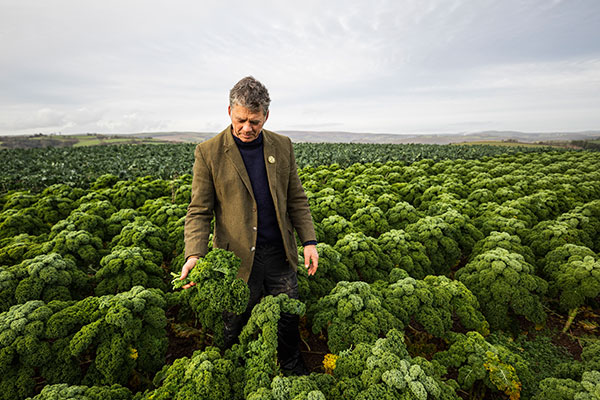As summer draws to a close, and crops are harvested and brought into store, I am finding space to give thanks.
For our temperate climate; for the forbearance of nature; and for the impassioned, eccentric and visionary founders of the Soil Association, and all those who came after them, who have painstakingly developed the organic standards which underpin the market we sell into. Without them, there would be no means for you to support what we do.
Organic farming is defined in national, EU and international law. In turn, these definitions are reflected in the farming standards of the Soil Association, the UK’s largest organic certifying body. Stretching to 180 pages, they detail what inputs we can use on the land, animal welfare, crop rotations, seed treatments, hedgerow management and so on.
Huge amounts of thought and debate have gone into these standards, which need to get organic farmers around the globe in close alignment. Any system that seeks to apply universal standards across such varied climates, soils, topography, economies, and agrarian and food cultures will be fraught with difficulty – but for the most part, it works well.
The Soil Association have earned lasting trust, facilitating the development of a market where concerned food-buying citizens can support the farming practices they believe in. Over 30 years, I have railed against some of the rules that ultimately made organic food more expensive – but time has usually proven the Soil Association right, and me wrong, and left me grateful to those with the patience to refine the rules. I can honestly say that I know of no food, environmental or ethical standard more worthy of your trust.
I remember standing in a field of failing grass seeds with my father, who explained with humility that he had “taken too much” from the field, depleting the soil’s fertility. He was starting to question being an intensive, chemical company-sponsored farmer, and looking for a more sustainable approach to his trade.
Behind the detail of the organic standards lie the simple principles that you must put back at least as much as you take – and that human existence, farming and food sit within the ecology of our planet, not on top of it. Organic is not a complete, or the only, solution to our environmental problems; we must go further. But it is a solid and worthwhile step in the journey.
Find out more about Organic September and the Soil Association at soilassociation.org/organic-september.















Keep telling it as it is Guy
Thank you Guy from a loyal customer and supporter.
I wish we could do more
Thank you, from a loyal customer. Our mixed French-British family only enjoys delicious and nutritious vegetables every week thanks to our team and to you, and considering we live in London, I consider this a miracle. Having eaten vegetables and fruit from my grand-parents gardens as a kid near Lyon, I knew how to taste the difference. What a joy!
Secondly, I really enjoy reading your posts, and the little notes in our weekly parcels. As Caroline28 wrote above, keep telling it as it is. Your writing is always highly informative, and well written too.
Many organic brands are – seemingly – pure marketing, since their produce doesn’t taste of anything. Riverford stands out, and this is because of your team and your own personal commitment for so many years. Thank you.
If you ever read this, a question : I have watched an old video or read a blog post where you explained the issues with recycling in London and the lack of harmonisation of curb-side recycling across the boroughs. In our borough, we cannot send vegetable waste for compost. Whom, in your experience, can move this forward? Lots of goodwill around, but I don’t see any progress. Perhaps I am too critical.. I am just observing how our council deals with waste, and I am not saying that it is easy to improve at all, but when there is a will… as they say…
Thanks for sharing your love of real food and delighted Riverford can help you enjoy veg as it should be. Regarding the composting, a great step if you can is to make your own – if you have even a small garden this guide will help: https://wickedleeks.riverford.co.uk/lifestyle/grow-your-own/how-make-compost If not, there are odourless kitchen composting systems you can have indoors too.. Lobbying your local council and MP is a good place to start if you want to help create these much needed changes to our recycling systems.